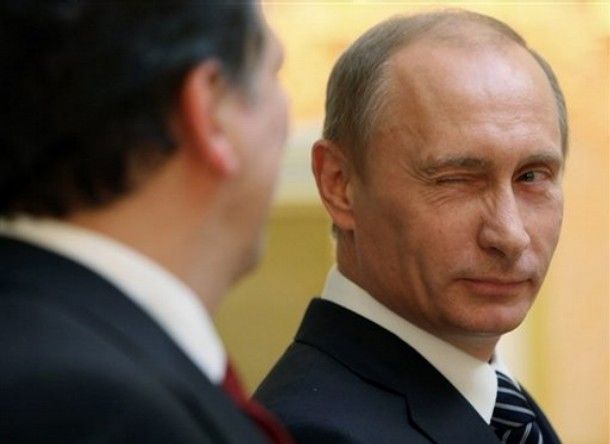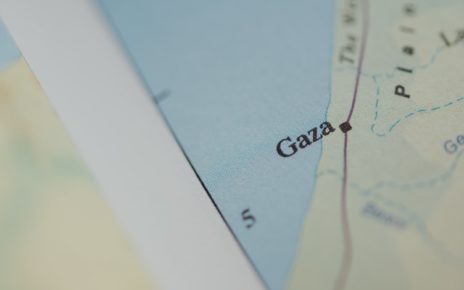“Make the lie big, make it simple, keep saying it, and eventually they will believe it.”
This quotation is often credited to Adolf Hitler, who first coined the phrase “Big Lie” in his 1925 publication of Mein Kampf.
Hitler’s explanation for the success of his own Big Lie, the “stab-in-the-back” myth that “international Jewry” purposefully brought about the collapse of the German war effort in 1918, was expressed as follows: “It would never come into [the masses’] heads to fabricate colossal untruths, and they would not believe that others could have the impudence to distort the truth so infamously.”
Every authoritarian leader, past and present, has perpetrated a Big Lie, upon which they have established a justification for their revisionist actions.
The Kremlin has taken its own Big Lie to new levels of depravity.
On March 18, the one-year anniversary of Russia’s illegal annexation of Crimea, President Vladimir Putin reiterated his own Big Lie:
“Ukrainians and Russians are one people.”
Here is the issue with Putin’s argument, and it is very simple: they aren’t.
Putin’s incessant “Ukraine denial” undermines the entire notion of an independent Ukrainian state. If Russia and Ukraine are one nation, then the concept of Ukrainian sovereignty is essentially annulled.
To claim that Russians and Ukrainians are one people is to completely misrepresent these two vastly different cultures. Even a cursory examination of recent Soviet history reveals the fundamental digression between the two nations.
Ukraine has long harboured European ambitions, much to the chagrin of the Russian political elite. This ambition manifested itself most evidently with the dissolution of the USSR in 1991. During the Soviet collapse, Ukrainian President Leonid Kravchuk refused to budge on the issue of Ukrainian independence, even as both General Secretary Mikhail Gorbachev and Russian President Boris Yeltsin urged him to participate in opposing unions.
These European aspirations have persisted to this day, and have intensified amid recent Russian aggression. A recent Pew survey assessing public opinion in Russia and Ukraine highlights the presently diverging paths of these two nations and illuminates Putin’s claim as nothing more than a form of revisionist history.
The survey found that 72% of Ukrainians possess favourable opinions of the European Union, while 60% of Russians view the EU as a negative organization.
In addition, a revealing question regarding the dissolution of the USSR found that while 47% of Ukrainians believe that this was a positive event, 69% of Russians believe the opposite. This view has oft been echoed by Putin himself, who has stated on many occasions that “the collapse of the Soviet Union was the greatest geopolitical catastrophe of the century.”
It is also important to point out that Ukraine has had extremely different responses to rotten political leadership. In the past decade, Ukrainians have twice amassed by the hundreds of thousands to protest against electoral fraud, political corruption, and civic misrepresentation. Both revolutions eventually led to the ouster of corrupt government leaders and a transformation to a more European-oriented government.
Noting the similarities in corruption between former Ukrainian President Viktor Yanukovych and Putin, an article in the Kyiv Post points out that Ukrainians were “outraged” by Yanukovych’s billion-dollar palace, while noting that ‘Russians don’t seem bothered by [Putin’s] kleptocracy.”
Indeed, Russia critic Bill Browder has estimated that Putin’s undeclared personal fortune amounts to approximately $200 billion, which would make him the richest person in the world, perhaps in history.
The Kyiv Post article concludes with a telling statement:
“If Russians were indeed similar to Ukrainians, there would be no Putin.”
However, the Big Lie is not so easily disproved. To quote Hitler’s treatise one more:
“Even though the facts which prove this to be [false] may be brought clearly to their minds, they will still doubt and waver and will continue to think that there may be some other explanation. For the grossly impudent lie always leaves traces behind it, even after it has been nailed down, a fact which is known to all expert liars in this world and to all who conspire together in the art of lying.”
Vladimir Putin certainly is an “expert liar,” and even more disturbingly, he has expanded his Big Lie to the Baltics.
On June 16, two lawmakers from Putin’s United Russia party petitioned the Prosecutor General’s Office to review the legality of the 1991 State Council decisions to grant independence to the Baltic states of Estonia, Latvia, and Lithuania. The request condemns the verdicts as “criminal acts” and “especially dangerous state crimes,” tantamount to treason.
And as required by Russian law, the Prosecutor General’s Office subsequently launched an official investigation on June 30 on the basis of this petition.
As Brian Whitmore, host of Radio Free Europe/Radio Liberty’s Power Vertical blog, expresses, Russia has truly slipped “into la-la land.”
There are several reasons as to why this investigation is absurd.
Firstly, and perhaps most obviously, the USSR has not been in existence for nearly 24 years.
Secondly, one must not forget that the USSR illegally annexed the Baltic states in 1940 on the basis of the secret protocols of the 1939 Molotov-Ribbentrop Pact.
These two Duma lawmakers are essentially demanding that the Prosecutor General’s Office renege on a decision made by a country that no longer exists on the basis of a constitution that has been defunct for nearly a quarter of a century, relating to three republics that were illegally annexed 75 years ago.
However, almost immediately after opening the investigation, Russian officials backed down.
Kremlin spokesperson Dmitry Peskov denied any knowledge of such an investigation. “I struggle to understand the essence of this initiative,” he expressed.
Meanwhile, Prosecutor General spokesperson Marina Gridneva concluded: “In this case, it is clear the matter has no legal prospects.”
Whatever the reasons behind the muffling of the investigation, the fact remains that the whole process was initiated because the two lawmakers who submitted the petition had absorbed Putin’s Big Lie.
And while the investigation into the legality of Baltic independence may yield no results, Russian policymakers are still finding other ways to test the sovereignty of these states.
More than 25 years after the fact, Russian policymakers have repeatedly threatened to prosecute the 1,500 Soviet army deserters from Lithuania who failed to report for duty after the republic declared independence in March 1990.
These investigations are emblematic of how Putin’s Big Lie has seeped into the heads of politicians and taxpayers alike. It has permeated the Duma, the lower house of the Federal Assembly, as well as the private houses of its citizens.
As to whether Putin himself has fallen victim to his own propaganda, one might offer a variation on Hitler’s initial assertion:
Make the lie big, make it simple, keep saying, and eventually you yourself will believe it.





